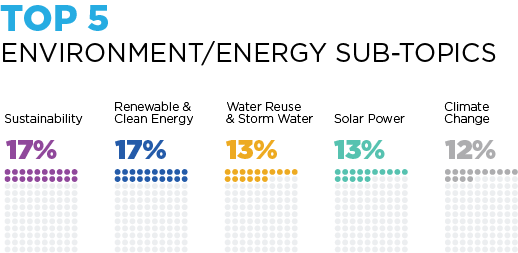Connecting state and local government leaders
While President Trump sent a signal that the United States is unwilling to lead in the fight against climate change, it's local governments that have committed to action.
By abandoning the historic Paris climate agreement, President Donald Trump sent a signal around the globe that the United States is unwilling to lead, or even partner, in addressing common environmental threats. Throughout the country, though, it is local governments that have committed to action on this important issue.
Cities of all sizes are responding to the effects of climate change, from regulating hazardous construction runoff to implementing clean energy sources like solar arrays on city facilities. While there is no question that President Trump’s move will impede efforts and weaken the resolve to curb global warming, the agreement itself is not action.
Action is local—by residents, by businesses and, increasingly, by local governments. One hundred thirty-four U.S. cities have committed to the Global Covenant of Mayors, the world’s largest coalition of city leaders addressing climate change, and 16 of those cities have committed to reducing their emissions by more than half.
This year, many mayors used their State of the City speeches to announce or reaffirm a commitment to preserving the environment and creating sustainable communities.
“Despite the federal government’s efforts to roll back environmental progress at the national and even global level, I will continue to reach out to mayors throughout the world to lead on climate change,” said Seattle Mayor Edward Murray in his February address. These sentiments were echoed in Atlanta, Boston and San Diego.
Each year, the National League of Cities analyzes over a hundred State of the City addresses—often the most important policy speech a mayor will deliver—to take the pulse of America’s local leaders. The policies discussed in these speeches reflect the innovation and commonsense leadership that has come to define local government.
For example, in New York, where inefficient buildings significantly contribute to carbon emissions, Mayor Bill de Blasio said the city is training people to retrofit buildings, reducing pollution and putting people back to work. And in New Haven, Conn., the city’s building permitting process “ha s been streamlined to accommodate more than 600 solar-power installations,” according to Mayor Toni Harp, helping businesses and households become less dependent on fossil fuels.
Often, sustainable policies not only help the environment, but also the city’s bottom line. In Amsterdam, N.Y., the city saved over $120,000 last year by connecting its solar array to the national grid. Investments in renewables and energy efficiency also help economically disadvantaged city residents. In Newton, Mass., a community shared solar energy project saves low-income households an average $50 in energy bills each year. “Our administration believes strongly that climate change is a threat to all and that we can play a significant role in protecting the environment while saving taxpayer money,” said Mayor Setti Warren.
Moreover, in coastal cities threatened by higher tides and stronger storms, city leaders are not sitting back. “We’re finding engineering solutions to sea level rise and flood control issues,” said Virginia Beach, Va., Mayor Will Sessoms. And in Charleston, S.C., Mayor John Tecklenburg announced plans to better orient city hall towards resiliency: “we know that sea level rise and extreme weather events are creating challenges that our city simply cannot solve with its existing practices and procedures.”
In the 120 speeches we analyzed for our State of the Cities 2017 report, 24 percent of mayors spoke at length about the environment and energy-related issues, covering several subtopics including:

Many cities made clear, specific and accountable goals towards reducing the harmful effects of climate change, including the following:
- Boston: Become 100 percent carbon-neutral by 2050
- Duluth, Minn.: Reduce municipal emission by 15 percent in mayor’s first term
- New Haven, Conn.: Join the Global Covenant of Mayors for Climate & Energy
- New York: Reduce emissions in city by 80 percent by 2050
- Reno, Nev.: Join the Compact of Mayors
- Salt Lake City: Rely on 100 percent renewable energy by 2032 and reduce total carbon footprint by 80% by 2040
- San Diego: Rely on 100 percent renewable energy and reduce greenhouse gas emissions by 50 percent by 2035
- San Jose, Calif.: Rely on 100 percent renewable energy by 2027
- St. Paul, Minn.: Become carbon neutral by 2050
- West Palm Beach, Fla.: Eliminate greenhouse gas emissions by 2050
Cities are taking positive steps in other ways as well. The national SolSmart program managed by NLC and other partners has designated 58 communities that are taking steps to make solar easier and more affordable for their residents, and NLC’s Leadership in Community Resilience program is helping cities advance their local resiliency goals.
These commitments signal a response to the reality of our time: changing our behavior now will provide a strategic advantage in environmental and economic quality of our cities. While the problem is global in scale, the solution is local.
If President Trump shows no leadership regarding climate, cities will fill the void. In many places, they already are.
Christiana McFarland is Director of Research and Trevor Langan is a Research Associate at the National League of Cities.

NEXT STORY: Federal Regulatory Battle Over Cuomo’s ‘I Love NY’ Signs Continues



